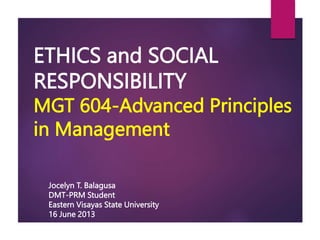
ETHICS & SOCIAL RESPONSIBILITY.pptx
- 1. ETHICS and SOCIAL RESPONSIBILITY MGT 604-Advanced Principles in Management Jocelyn T. Balagusa DMT-PRM Student Eastern Visayas State University 16 June 2013
- 3. - standards that govern how members of a society should deal with one another in matters involving issues such as fairness, justice, poverty, and the rights of the individual. Societal Ethics
- 4. - standards that govern how members of a profession, trade, or craft should conduct themselves when performing work-related activities. Occupational Ethics
- 5. - personal standards and values that determine how people view their responsibilities to others and how they should act in situations when their own self- interest is at stake. Individual Ethics
- 6. - the guiding practices and beliefs through which a particular company and its managers view their responsibility toward their stakeholders. Organizational Ethics
- 7. Social Responsibility - is the implied, enforced, or felt obligation of the company to serve or protect the interests of its stakeholders other than themselves. - “social contract” – is the set of written and unwritten rules and assumptions about acceptable interrelationships among various elements of society.
- 9. - companies and their managers choose not to behave in a socially responsible way. Instead, they behave unethically and illegally and do all they can to prevent knowledge of their behaviour from reaching other organizational stakeholders and society at large. Obstructionist approach
- 10. - indicates at least a commitment to ethical behaviour. Defensive companies and managers stay within the law and abide strictly with legal requirements but make no attempt to exercise social responsibility beyond what the law dictates, thus, they can often do act unethically. Defensive approach
- 11. - it is an acknowledgement of the need to support social responsibility. Accommodative companies and managers agree that organizational members ought to behave legally and ethically, and they try to balance the interests of different stakeholders against one another so that the claims of stockholders are seen in relation to the claims of other stakeholders. Accommodative approach
- 12. - it actively embrace the need to behave in socially responsible ways. They go out of their way to learn about the needs of different stakeholder groups and are willing to utilize organizational resources to promote the interests not only of stockholders but also of the other stakeholders. Proactive approach
- 13. Grievance Procedures What is Grievance? - it is a written complaint as opposed to an oral one against the actions, or lack of action, of the employer in matters relating to the member’s terms and conditions of employment.
- 14. Types of Grievances 1. individual grievance 2. group grievance 3. union policy grievance
- 15. settlement arbitration “settle the grievance at the lowest step possible, the higher up you go the harder will be settle” Grievance Procedures
- 16. refer to the collective agreement. Details of the Grievance - Use the “KISS” principle (keep it simple steward) Corrective Action Requested - Always keep the grievor informed about the status of the grievance. Writing the Grievance
- 17. - If the decision or settlement is not satisfactory to the grievor, it can be transmitted to the next level in the grievance process. - Within the time limit provided for it not to become null and void. Transmittal of the Grievance
- 18. - it is the final stage of the grievance procedure and is a hearing before an impartial third party. Investigation of a Complaint or Grievance - decide on its merits and investigate it Arbitration
- 19. 1. listen carefully to the members statement 2. write down the information and points to be made 3. ask questions for clarification or additional information 4. distinguish between facts and opinion Getting Facts
- 20. 5. determine which facts are relevant to the matter under discussion 6. note management and union records you will want to check 7. note people you will want to interview 8. check and recheck the collective agreement 9. determine what additional documentation and information is available Getting Facts
- 21. 1. who? 2. what? 3. when? 4. where? 5. why? 6. want 7. whoa! The 7 “W’s”
- 22. The Grievance Hearing Basic Points to Remember 1. remember, if you don’t have the facts to back your case, you don’t have a case. 2. make sure that every statement of fact raised is checked thoroughly before you attempt to answer it. 3. when a contradiction in a statement exists, try to obtain witnesses other members if you are sure in your own mind that your facts are correct.
- 23. 4. get all the facts into the case at the earliest possible step in the grievance procedure. 5. support your facts and contentions, if possible, by contract language, previous arbitration awards and past practice. 6. recheck your case to make sure the 7 w’s have been answered. 7. recheck the collective agreement carefully. The Grievance Hearing Basic Points to Remember
- 24. 8. before approaching the employer’s representative at the first level, determine the extent of their authority. 9. if you can’t reach a settlement with the first level, then proceed to the next, but tell first level you are doing so and keep the member informed about what you and the union are doing. 10. keep complete written records of information and actions. The Grievance Hearing Basic Points to Remember